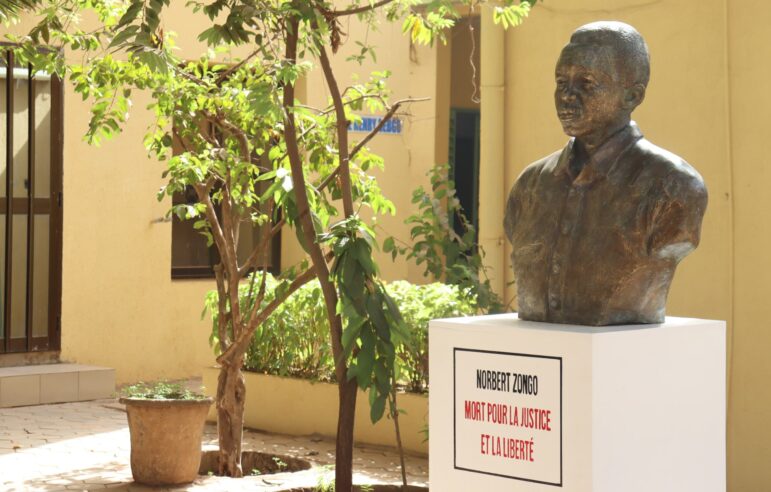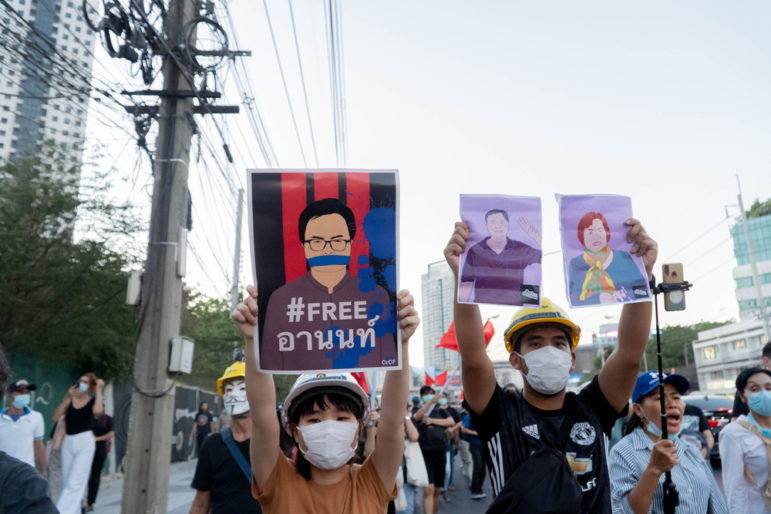

Journalism Needs to Reinvent Itself: A Q&A with OSF’s Maria Teresa Ronderos
How should philanthropies with limited resources act to stem the tide of a global recession in independent journalism? In recent years, an authoritarian crackdown on media across multiple continents has closed so much space for news and information that only 13 percent of the world’s population now lives in a country with a free press.
At roughly the same time, democracies and developing democracies have witnessed the collapse of those business models that used to sustain journalism. This has left media outlets vulnerable to influence by special interests while further cementing an ongoing crisis of trust vis-à-vis the public.
Up against challenges that dwarf the resources of the entire philanthropic sector, the Open Society Foundations (OSF), one of the largest private philanthropies supporting journalism globally, must selectively and strategically fund media to produce a visible impact. Initiatives aiming to bolster free and independent media have represented a strategic priority for OSF grant-making since the foundation was established by Hungarian-American financier George Soros in 1979.
Responding to a period of rapidly evolving threats to independent journalism, OSF altered its strategy for media development funding in 2014 by restructuring the foundation’s Media Department and rebranding it as the Program on Independent Journalism (PIJ). Backed by an annual budget of $13.2 million (2017), the PIJ marks a shift from the work of its predecessor as it has ceased working on media policy and reform issues to focus predominately on supporting newsrooms.
Currently, the program consists of four key portfolios on opening journalism, investigative journalism, journalist safety and knowledge sharing.
Since 2015, the PIJ has been led by Colombian investigative journalist Maria Teresa Ronderos. Having written extensively on democratization, violence and corruption across Latin America throughout her journalistic career, Ronderos is intimately familiar with the everyday struggles journalists, including OSF grantees, face in the field.
Embodying the PIJ’s focus on supporting newsrooms, she views her program’s work as “supporting journalism through journalism.” Ronderos was a guest speaker at the Center for Media, Data and Society (CMDS) summer course “Funding Journalism in the Digital Age,” where she discussed how PIJ’s grant-making strategies have evolved to promote media sustainability.
We spoke to her to learn more about how ever-evolving threats to media freedom and independence worldwide have impacted the way she approaches funding media at OSF.
From your perspective as a donor, what do you see as the most prominent challenges to independent media today?
The most important challenge for journalism is to find its identity and redefine its role in society. I think journalism has to reinvent itself. The business model crisis that everybody is referring to is not purely a business model crisis. The origin of this crisis is an editorial model crisis and it’s more existential. Journalism used to have a pseudo-monopoly, in a broad sense, on news and information, and people turned to it.
Now, however, there is an abundance of information, the complete opposite. So, what is journalism’s role in today’s society? How can it survive not just in terms of business and sources of financing but as something people recognize and give value to?
I think we are already starting to see some cases in which journalists have found their role and have inserted themselves into society. Then the money problem is solved because people identify it as valuable and are willing to pay for it and investors are prepared to invest.
The challenge of how to differentiate yourself from the humongous amount of information flowing on the internet also derives from this issue. How can you tell people “we are different?” If this is a sea, (how can we tell people) there are lots of fish, but this fish called journalism is a special kind of fish because it actually feeds your mind, and it’s very important for informing democracy.
In many cases, this crisis of funding journalism you have mentioned is brought on by or exacerbated by policy. States have either intentionally imposed financial hardship on news media or capitalized on its poor financial state for political gain. How has OSF gone about tackling this policy challenge to journalism?
The Program on Independent Journalism that I direct is just one little piece of OSF. Everything we do is for journalism through journalism. For regulation and rules, I think a lot of the (OSF) national foundations and advocacy offices in Brussels and Washington, are very much engaged. Some of the other programs (at OSF) that are focused on things like fiscal governance, the Justice Initiative or other human rights programs are doing much more work to influence the regulatory space and political sphere.
What we do is mostly to support journalism. It is complementary, and we must be complementary to each other. Having said that, we do support very large organizations that do policy too. I am talking about Article 19, IFEX and the Committee to Protect Journalists.
The grants we give often go toward supporting their advocacy work, their general work to improve the environment and convince judges, governments, etc. that this (an open environment for media) is an important value to support.
Has the sheer scale of the problems we have discussed or any other challenges you have encountered during your work at OSF prompted you to change your funding strategy?
There is a closing environment for media at the moment. In the last four years, I could travel to places that I cannot travel to now. There are places like Armenia or Malaysia that are opening, but (overall) I think that the entire atmosphere has become incredibly aggressive toward journalists and a profession where you try to use a methodology to tell the truth or come as close to the truth as you can, verify information and not take sides.
It has just become dangerous.
Look at the Philippines and the United States. There is an atmosphere of aggression from the top of the government. In Russia, space is closing and people are going outside the country to tell their stories. We saw two journalists assassinated in Western Europe. You are seeing more legal harassment and journalists being pushed into jail. And, of course, you also have the old perils of journalism with corrupt dictatorships, war and organized crime in half of Latin America and in the Balkans.
So yes, we have changed our strategy. Of course, now we have made a big effort to understand this atmosphere of digital media, which has become so murky and manipulated, sometimes by foreign powers and sometimes by local powers who want to influence democratic processes. We are trying to see how journalism can fight this.
Then, on the other hand, in our “Free and Safe” initiative we are trying to support journalists to get much more engaged in protecting themselves and their communities of journalists. We support a lot of NGOs (on this issue), but we want journalists and editors to unite because we believe that if they unite they can be much more powerful than any NGO. They haven’t realized how much they can do if they unite, even though they are competitors, against common threats that are dangerous for the profession.
OSF has stated that it is moving away from a funding model that supports specific countries and regions just because they are strategically important and toward a model that funds innovative ideas wherever they are located and especially if they have the potential to be replicated internationally. In light of the challenges to journalism you have highlighted, are there certain innovations or global trends you are particularly excited about?
We are finding more and more models like Krautreporter (German digital magazine) that conceive of themselves as facilitators of a community of people who have a lot of information and knowledge on different issues. Some people have a lot of knowledge about brain surgery or sports and others have a lot of knowledge about schools because they go to school or they are teachers. So, in a new way, journalists curate (this) information, put it together, and then research and verify. In these communities, nobody else is dedicated to actually doing this work. People need it and want it to be done by people they can trust.
So, if people know the media because they have participated in it and have contributed information, they know what the sausage is made of. You see a growing model in Europe with De Correspondent (in the Netherlands) and several other projects in countries like Sweden, Slovenia, etc. But we also see very similar models in Uruguay, South Korea and Paraguay.
Another kind of experiment is cross-border journalism. The biggest example that everybody has seen was the Panama Papers with the International Consortium of Investigative Journalists. Big problems cross borders and if you collaborate among journalists and professionals across borders, you really find their sources.
If you are investigating the contamination of a river, you go upstream and it is probably in another country. Sometimes, if you want to understand the government in your own country, you have to go to other countries. To be able to inform the public well of what is happening in the 21st century, you need to collaborate and think in a way that is not competitive but collaborative.
And this is another way journalism is defining itself.
When the Panama Papers came out, it told the world, “This is journalism. This is why we are different. We can collaborate and come out with a really special product that nobody else can give you. Nobody writing opinion pieces, no government producing propaganda will ever produce something like us. We are completely different.” It is a way of letting the people trust media because they know it is a different thing.
Also, while people often associate innovation with technology, an innovative approach in media could simply inform a society about something nobody else speaks about. Journalists concentrate on an area where information is scarce. By filling a gap in society, journalists show their commitment to it. This is really important for our strategy.
You have previously said that both donors and journalists need to rethink what a grant is. What do you mean by this, and what do you think a grant can and should accomplish?
This depends on the circumstances. There are circumstances that are so dire that grants are essentially for survival because there is very little access to any other type of capital or the situation in that society is extremely difficult. But even in these circumstances, I would invite journalists to think about grants as capital, as equity, an investment they will use to be able to become independent in the short run or the long run. It could take a few years to develop and understand how society can value their work to the point that they will give money, but it is a better use of a grant in the sense that it guarantees your future, your independence and most importantly: real development and the transfer of knowledge.
The problem is that a lot of the traditional grants keep grantees dependent all the time. People need to think a little more strategically and not so much about who is willing to give money, but more about what kind of money they want and what they want money for.
Some people might decide that they are going to live off grants. They don’t want to try anything else because they can’t. The circumstances won’t allow it. Okay, but if you are going to do this, develop a strategy and make sure that one grant leverages the other. Get a grant for planning or for investigating who your possible donors are. Take it to the next level. Instead of thinking about what the donors want, think about who is going to give you the types of grants that will let you do what you want to do.
Open Society Foundations (OSF)
- Year of foundation: 1993
- Legal status: Charity (in the U.K. where the PIJ operates)
- Countries covered by grants in journalism: Global
- Source of funding: George Soros
- Total yearly budget: $940,700,000 (2017)
- Average spending in media and journalism programs:
Total (2017): n/a - Yearly spend by Program on Independent Journalism (2017): $13,200,000
Maria Teresa Ronderos is head of the Open Society Program on Independent Journalism since 2014. She is a Colombian journalist who served as the editor of Semana, Colombia’s leading news magazine and VerdadAbierta.com, a website covering armed conflict in Colombia. She authored the bestselling book on armed conflict in her country, Guerras Recicladas, for which she was awarded the Simon Bolivar National Award for “Journalist of the Year” in 2015.
This post first appeared on the CEU Center for Media, Data and Society website and is reproduced here with permission. Note: OSF’s Program on Independent Journalism is a long-time donor to GIJN.
 Ian Graham is a Center for Media, Data and Society intern and works as a researcher for the Media Influence Matrix project. He’s currently a master’s candidate in public policy at Central European University in Hungary. He specializes in media development, with a particular interest in good governance and anti-corruption.
Ian Graham is a Center for Media, Data and Society intern and works as a researcher for the Media Influence Matrix project. He’s currently a master’s candidate in public policy at Central European University in Hungary. He specializes in media development, with a particular interest in good governance and anti-corruption.









